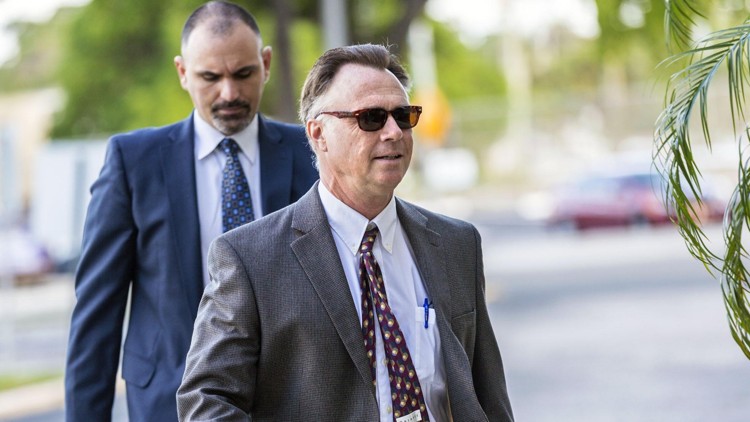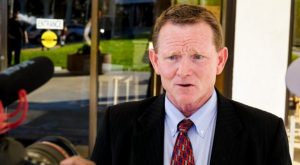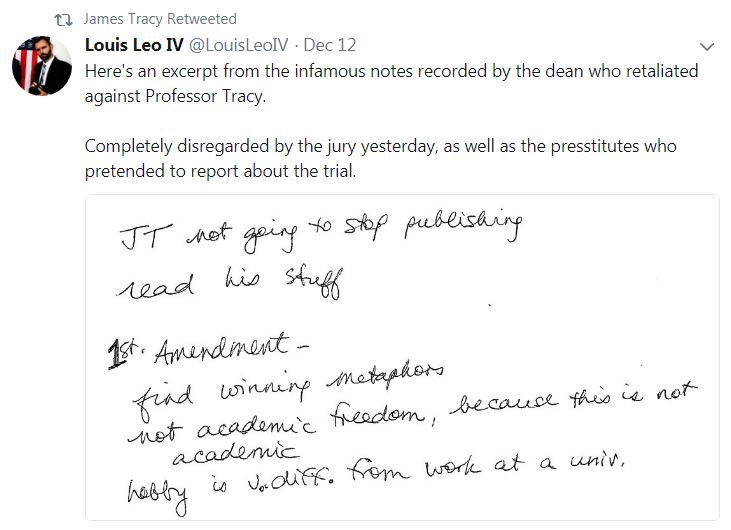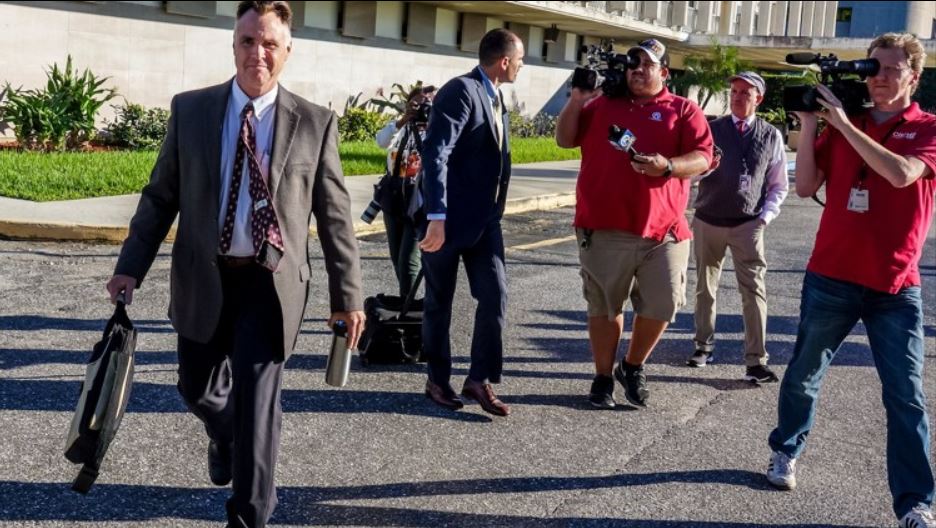The Death of Academic Freedom: Prof James Tracy Denied First Amendment Rights by Federal Court
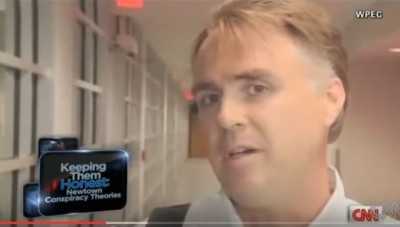
Global Research brings to the attention of its readers this review article pertaining to the West Palm Beach court decision regarding Prof. James Tracy’s dismissal from Florida Atlantic University (FAU). Whilst opinions may diverge regarding the events at Sandy Hook, we nonetheless believe that First Amendment Rights should prevail with a view to preserving academic freedom.
***
On December 11, 2017, in a serious miscarriage of justice, a jury in West Palm Beach, Florida, ruled unanimously in favor of Florida Atlantic University and against former Media Studies Professor James Tracy, who was suing for reinstatement after his firing in 2016. The jury found that Tracy’s “controversial” articles on Memory Hole Blog were not a “motivating factor” in his firing, the only question they were required to consider. Of course, Tracy’s posts at “his conspiracy theory blog” were indeed the reason he was fired, but the jury was convinced otherwise by FAU’s legal team with assistance from the judge. The case centered around Tracy’s writings on the anomalies found in the reporting on the Sandy Hook “massacre” of December 14, 2012. His skepticism about the event was not to the liking of the university.
James Tracy with his attorney Louis Leo IV arriving at federal court. (Source:Palm Beach Post)
FAU maintained that Tracy was not fired from his tenured position because of his blog posts, but because he did not follow the “rules” set out by “his bosses” at the government-run institution. FAU attorney G. Joseph Curley insisted that Tracy was not denied his First Amendment rights, but that he simply did not follow university procedure.
“Professor Tracy doesn’t follow the rules,” Curley told the jury. “They’re rules that everyone else follows. He doesn’t play by the rules.”
FAU cast the case as one of a “belligerent,” rebellious,” and “nonconformist” employee being let go for “insubordination,” instead of that of a tenured professor exercising his right to free speech.[1]
FAU’s current “rules” require that faculty submit forms listing “outside activities” to be vetted for administrative approval, whether the activities are compensated or not. Tracy and other professors at FAU had argued that the policy is vague and confusing, constituting a form of prior restraint forbidden by the First Amendment, and leading to a climate of “fear and uncertainty” among the faculty. Aside from the fact that “outside activities” can reach into all aspects of a professor’s life and therefore be difficult if not impossible to list, such activities must not be subject to bureaucratic approval. And certainly, no tenured professor can be fired for not filling out a form, even at Florida Atlantic University.[2]
Tenure and academic freedom
The reason for tenure at academic institutions is precisely to allow professors to research, write, and speak out without fear of reprisal. The road to tenure is long and difficult, embarked upon with the goal of attaining the “academic freedom” that tenured professors enjoy.[3] According to the American Association of University Professors (AAUP), as outlined in their 1940 Statement of Principles on Academic Freedom and Tenure, “Teachers are entitled to full freedom in research and in the publication of the results, subject to the adequate performance of their other academic duties.” Regarding “outside activities,” the statement includes the following:
College and university teachers are citizens, members of a learned profession, and officers of an educational institution. When they speak or write as citizens, they should be free from institutional censorship or discipline…they should at all times be accurate, should exercise appropriate restraint, should show respect for the opinions of others, and should make every effort to indicate that they are not speaking for their institution.
The statement was amended in 1970 to stipulate:
The controlling principle is that a faculty member’s expression of opinion as a citizen cannot constitute grounds for dismissal unless it clearly demonstrates the faculty member’s unfitness for his or her position. Extramural utterances rarely bear upon the faculty member’s fitness for the position.
This is further reinforced by the AAUP in its executive summary of 2011, “Ensuring Academic Freedom in Politically Controversial Academic Personnel Decisions.” The AAUP sees a current “political threat” to academic freedom from outside forces, including interest groups, politicians, and members of the media, which can put pressure on the university. All personnel decisions should rest on “academic fitness” and no institution should discipline academic speech “unless that speech implicates professional fitness.”
James Tracy was clearly not unfit for his position, having received evaluations indicating that his teaching, scholarship, service to the institution, and job performance were considered to be “excellent.” Curley fought to keep these evaluations from the jury; only when he had left the courtroom one afternoon were Tracy’s attorneys able to get them included in the record.
FAU conspiracy with the judicial system?
Tracy filed suit in April 2016, alleging a conspiracy between FAU and the faculty union, which had advised him not to fill out the outside activities forms, discouraged him from initiating a grievance or lawsuit, and even attempted to coerce him into resigning from his position. FAU delayed proceedings by the filing of repeated motions alleging that the suit was “frivolous,” that there was no conspiracy, and that Tracy’s termination was merely due to his failure to disclose his outside activities in a timely fashion.
In February 2017, federal judge Robin Rosenberg ruled that Tracy’s lawsuit could proceed to discovery, with defendants including FAU, the Board of Trustees, President, Dean, Associate Provost, the Florida Education Association, the faculty union (United Faculty of Florida) and the union’s Chapter President and Service Unit Director.[4]
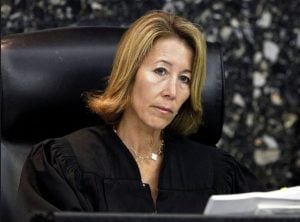
US District Judge Robin Rosenberg of the US District Court for the Southern District of Florida. (Source: Palm Beach Post)
This allowed Tracy’s legal team to obtain thousands of internal emails from FAU, which supported his contention that members of the administration had conspired to discipline and finally fire him. The case proceeded on the basis of the Second Amended Complaint, which included six individual counts as follows:
- Count I – Retaliation in Violation of Right to Free Speech, against Defendant FAU and Defendants President John Kelly, Associate Provost Diane Alperin, and College of Arts and Letters Dean Heather Coltman.
- Count II – Conspiracy to Interfere with Plaintiff’s Civil Rights, against Defendants Alperin, Coltman, Kelly, UFF President Robert Zoeller, Jr., UFF Service Unit Director Michael Moats, UFF, Florida Education Association, and FAU.
- Count III – Facial Challenge to FAU’s Conflict of Interest Policy, against Defendant FAU.
- Count IV – As-Applied Challenge to Plaintiff’s Right to Free Speech, against Defendant FAU.
- Count V – Declaratory Judgment and Injunction, against Defendant FAU.
- Count VI – State Law Breach of Contract, against Defendant FAU.
Although the Second Amended Complaint shows clear evidence supporting every count, Judge Rosenberg eliminated all but the first count in her order on pending motions for summary judgment of October 31, 2017.[5] This reduced the case to a matter of why Tracy was fired— whether because of his blog posts or for not submitting his outside activities forms—and the decision was left up to a jury. This arguably suggests that the judge was aiding Defendant FAU in reducing the complaint to one of simple intent without reference to the complexities of the case and the large amount of evidence against the university. All this evidence was disregarded by the jury and ignored by the press.
Incriminating memo by defendant Dean Heather Coltman of January 2013, part of the evidence discounted by the federal jury.
This had the effect of putting Tracy on trial (although he was the plaintiff and not the defendant), judged not by his actual peers but by a jury composed of members of the public who did not understand the full implications of the case—because much of the evidence was suppressed. Neither did they understand the implications of tenure, as they were not academics themselves. This upended the complaint and trashed many months of hard work by Tracy and his lawyers— work detailed in the 90 legal documents posted at the James Tracy Legal Defense Fund website.
FAU conspiracy with the press?
Much has been written about the massive bad press that James Tracy has received, beginning in the aftermath of the Sandy Hook event. This was instigated by the Florida Sun Sentinel and then taken up by the national mainstream and alternative media.
The Sun Sentinel published a letter of December 10, 2015, written by Lenny and Veronique Pozner, publicized as the only Jewish family to have lost a child in the alleged Sandy Hook shooting. The letter, “Sandy Hook Massacre 3rd Anniversary: Two Parents Target FAU Conspiracy Theorist,” was reprinted in the Forward on December 14. The letter accused Tracy of “torturing” the victims’ families, and called for his firing:
A plethora of conspiracies arose after Sandy Hook, but none received as much mainstream publicity as Tracy, who suggested that the shooting never occurred and the Obama administration had staged the “event” to prepare the country for strict gun control measures.
More than 800 news agencies covered the story of his denial. As a result, this professor achieved fame among the morbid and deranged precisely because his theories were attached to his academic credentials and his affiliation with FAU. Tracy has enjoyed tremendous success from this exposure and has since leveraged it into a popular Internet blog and radio program. Worse yet, it has elevated his status and fame among the degenerates that revel in the pleasure of sadistically torturing victims’ families.
The Pozners’ accusations were false, as has been shown, but nonetheless they were picked up by other media outlets and used to bash Tracy in the US press. Strangely, the letter contains information that only an insider would likely have known. And it was this letter that brought on Tracy’s dismissal on January 5, 2016, although FAU insists that there was no connection. “The timing of it is completely coincidental,” said FAU attorney Curley. “The optics of course look like the school is retaliating, when they’re not.”
The trial was covered by the local Florida press and kept out of the national media, with the exception of brief, disparaging reports in the Washington Post and New York Daily News. The titles of the articles indicate their biased nature:
- “Trial To Begin for Fired FAU Professor, Conspiracy Theorist James Tracy,” Sun Sentinel, November 27, 2017
- “Ex FAU Professor, Conspiracy Theorist James Tracy, Testifies about Firing in Free Speech Case,” Sun Sentinel, November 30, 2017
- “FAU Professor James Tracy Claims School Fired Him for Sandy Hook Rants,” Palm Beach Post, November 30, 2017
- “Ex-FAU Prof on Trial Tries To Downplay Attack on Sandy Hook Parents,” Palm Beach Post, December 1, 2017
- “FAU Prof Wasn’t Fired Because of Sandy Hook Blog, FAU Official Testifies,” Sun Sentinel, December 4, 2017
- “Christie: Tracy-vs-FAU More about Arrogance Than Free Speech, Insubordination,” PalmBeachPost.com, December 5, 2017
- “FAU Prof James Tracy’s Firing ‘Wasn’t a Surprise’ to Him, University Officials Say,” Sun Sentinel, December 5, 2017
- “What It Was Like in the Class of FAU’s Conspiracy-Spinning Professor,” Palm Beach Post, December 8, 2017
- “Claims against FAU by Sandy Hook Denier Headed To Federal Jury Monday,” Palm Beach Post, December 8, 2017 and
- “Jury Rules against Fired FAU Prof James Tracy in Free Speech Case,” Sun Sentinel, December 11, 2017
This last article pushes the idea that Tracy was an ordinary employee who “repeatedly refused to obey reasonable requests from his bosses.” It quotes Curley as saying that FAU officials were glad they got to “set the record straight. According to the article:
FAU said it was about an employee who didn’t want to listen to his bosses, his peers or his union officials…Tracy used his position as an FAU professor for “self-promotion” and to bolster his blog’s reputation, Curley said. FAU officials testified Tracy lied to them about using university resources to write his blog…Curley listed several examples of Tracy’s failure to follow the rules and comply with reasonable requests from his employers. The school wasn’t his priority.
“The school was a platform for him—that’s not what it’s supposed to be about,” Curley said. A video in the article features an interview with Curley; watch it and judge for yourself whether this is an honest man.
Louis Leo warns off local reporters as the team departs the court house. (Source: NBC)
G. J. “Joe” Curley is a Florida “super lawyer” and shareholder with Gunster, “Florida’s law firm for business.” According to Gunster’s website, “Joe most often represents business clients with complicated employment and commercial matters in court”; his experience includes “the achievement of zero verdicts for institutional defendants, injunctions involving hundreds of millions in issue, as well as multi-million dollar verdicts in a variety of business related disputes.”
On December 11, immediately following the verdict in the trial, attorney G. Joseph Curley became Judge Curley—appointed to the Fifteenth Judicial Circuit Court by Florida Governor Rick Scott. “Curley’s appointment came just hours after he won a high-profile case involving a professor from Florida Atlantic University.” The “timing” of this was surely “completely coincidental” as Curley might say. [6] Governor Rick Scott will be familiar as the official who dominated the media after the Pulse nightclub event in Orlando.
The fifth anniversary of the Sandy Hook incident
Yet one more “coincidence” had the trial scheduled to run right up to the fifth anniversary of the Sandy Hook “shooting” on December 14, 2017. As expected, the mainstream press featured the “massacre” once again in major venues including The New York Times, The Wall Street Journal, and the New York Daily News.
Yet it has long been known that the official story is far from the truth. Much of the evidence can be found online in articles, lectures, and films (although Memory Hole Blog and many important youtube channels have been taken down).
If you don’t believe me, you are not alone—although at least one-fourth of the US public reportedly now thinks they’ve been played. A poll conducted by Fairleigh Dickinson University in October 2016 found that 24% of Americans interviewed believed that it was at least possible that the Sandy Hook “shooting” was “faked in order to increase support for gun control.” It is likely that even more people now hold this opinion. Those who orchestrated the event are desperate to keep the facts from emerging, by banning books, pulling videos off the internet— and firing Professor James Tracy for daring to investigate.
Tracy’s legal team is considering an appeal based on Rosenberg’s order on motions for summary judgment, which limited the proceedings to one count only. Tracy has been without a job and an income since he was fired, his scholarly reputation has been ruined, and he remains a subject of ridicule in the press. Not only has he suffered cruelly and unjustly, but academic freedom is now in real danger. In a statement by Tracy to the Washington Post:
In my view the Tracy v. FAU decision will embolden university administrators across the US to scrutinize the personal affairs of faculty members with whom they disagree, and they’ll be more inclined to discipline or terminate vulnerable faculty knowing a set of legal precedents are being established in this vein.
One positive outcome of the trial is the classification by Rosenberg of Tracy’s blog posts as private speech on matters of public concern, such as mass shootings, government conspiracies, and the like. With this, she threw out FAU’s repeated assertions that Tracy was conducting academic research on Memory Hole Blog pertinent to his employment. This may help with an appeal. But an appeal will require more resources. If you can support this cause, visit the James Tracy Legal Defense Fund website and click on “Give.”
Vivian Lee is the nom de plume of a tenured professor at an east coast university.
Notes
[1] FAU Defendants’ Answer and Affirmative Defenses to Plaintiff’s Second Amended Complaint, page 74, section 5. https://tracylegaldefense.files.wordpress.com/2017/03/fauanswer.pdf
[2] Collective Bargaining Agreement, 2012-2015, Florida Atlantic University Board of Trustees and the United Faculty of Florida, Articles 15.1 and 16.1. http://www.fau.edu/provost/faculty/files/CBA-2012-2015-Oct2015.pdf
[3] Vivian Lee, “American Academic Freedom in Jeopardy: Professor James Tracy vs. Florida Atlantic University (FAU), Global Research, May 7, 2016. https://www.globalresearch.ca/american-academic-freedom-in-jeopardy/5523940
[4] Vivian Lee, “Academic Freedom Lawsuit to Proceed: Judge Affirms First Amendment Rights.” Global Research, March 8, 2017. https://www.globalresearch.ca/academic-freedomlawsuit-to-proceed-judge-affirms-first-amendment-rights/5578399
[5] Omnibus Order on All Pending Motions for Summary Judgment. https://tracylegaldefense.files.wordpress.com/2017/11/summary-judgment-order-11-1-17-1.pdf
[6] The governor of Florida also appoints 14 of the 17 members of the Board of Governors of the state university system of Florida. The governor appoints six of the 13 members of each state university’s Board of Trustees, and members of the Board of Governors appoint five of the 13. The governor thus controls appointments to the Board of Trustees of FAU.


